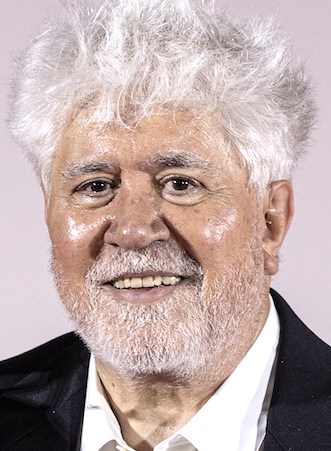On this date in 1949, filmmaker Pedro Almodóvar Caballero was born in rural Calzada de Calatrava, Spain, to Francisca Caballero and Antonio Almodóvar. His father, never a financial success in various enterprises, at the time was sort of a traveling salesman with his wares packed on the back of a mule. His mother earned pocket money by reading and writing letters for illiterate neighbors.
His brother Agustín later described their rustic birth village as “the sort of place where people spend their whole lives saving up for a decent headstone in the cemetery.” Almodóvar got a scholarship at age 8 to attend a Catholic boarding school run by Salesian priests and soon knew the priesthood did not appeal to him like it did his parents.
He moved to Madrid to attend the National School of Cinema when he was 18, supporting himself as an administrative assistant with the phone company Telefónica, where he worked for 12 years while enmeshing himself in experimental film and theater and writing for newspapers and magazines. His first feature film, “Pepi, Luci, Bom” (1980), attracted followers and drew comparison to films by John Waters for its irreverence toward sexuality and social mores.
His next feature, “Labyrinth of Passion” (1982), focused on a nymphomaniac pop star who falls in love with a gay Middle Eastern prince. It drew even more followers and marked the first of several collaborations with actor Antonio Banderas. “Dark Habits” (1983), a black comedy, featured a cabaret singer seeking refuge in a convent of nuns with extremely sordid and some illegal habits (lesbianism, cocaine, murder). It drew controversy from religious critics after premiering at the Venice Film Festival.
Almodóvar started his own production company, El Deseo, in 1986. Nearly all its staff members in 2004 were women, explained production director Esther García in the New York Times Magazine: “There’s an expression in Spain. One cock and all hens. That is this company. Pedro communicates very well with women.”
The film that brought him attention and success in the U.S. was “Women on the Verge of a Nervous Breakdown” in 1988. “Tie Me Up! Tie Me Down!” (1990), was initially given an X rating, later changed to NC-17. “All About My Mother” (1999) won an Oscar and Golden Globe for Best Foreign Language Film. “Talk to Her” (2002) brought Almodóvar his first personal Academy Award, for Best Original Screenplay, and he was nominated for Best Director.
“Bad Education” (2004) focused on a priest’s sexual relationship with his teen male student. Discussing the film made him remember his Catholic education and how he was told he had an “abrasive” character. “Because my education was under the priests, I always had problems. The priests considered my questions heretical. I discovered the word ‘hedonist,’ and I thought of myself as a hedonist. At the same time — I think it was after seeing an Antonioni movie — I discovered the word ‘nihilism.’ I was 10 or 12.” (New York Times Magazine, Sept. 5, 2004)
After several dramatic and serious films, the comedic “I’m So Excited!” (2013), the title of a Pointer Sisters song, was deemed by one reviewer as “a piece of extravagant, kitsch entertainment.” Almodóvar called it “my gayest film ever” when it was released. (The Guardian, April 27, 2013)
“The Room Next Door” (2024) premiered at the Venice Film Festival and became the first Spanish film to win the Golden Lion. Starring Tilda Swinton and Julianne Moore, it was Almodóvar’s first feature-length film in English. Though he is fluent in English, he prefers to speak and write in Spanish.
Moore’s role is best friend to Swinton, who is dying after failed cancer treatments and wants to end her life peacefully with a euthanasia pill she bought on the dark web. “When I was younger, I didn’t think so much about death because, in my case, that I don’t believe in God,” Almodóvar explained. “[I]f I am seriously ill, then absolutely I want to decide about my death. If life doesn’t offer me nothing but pain, then I want to be the owner of my death.” (NPR “Morning Edition,” Dec. 19, 2024)
Openly gay and an avowed atheist, he described himself as actively bisexual until age 34 and has been with his partner, the actor and photographer Fernando Iglesias, since 2002. They live in separate dwellings in Madrid.
PHOTO: Almodóvar at the 2024 Venice International Film Festival; Harald Krichel public domain photo.


